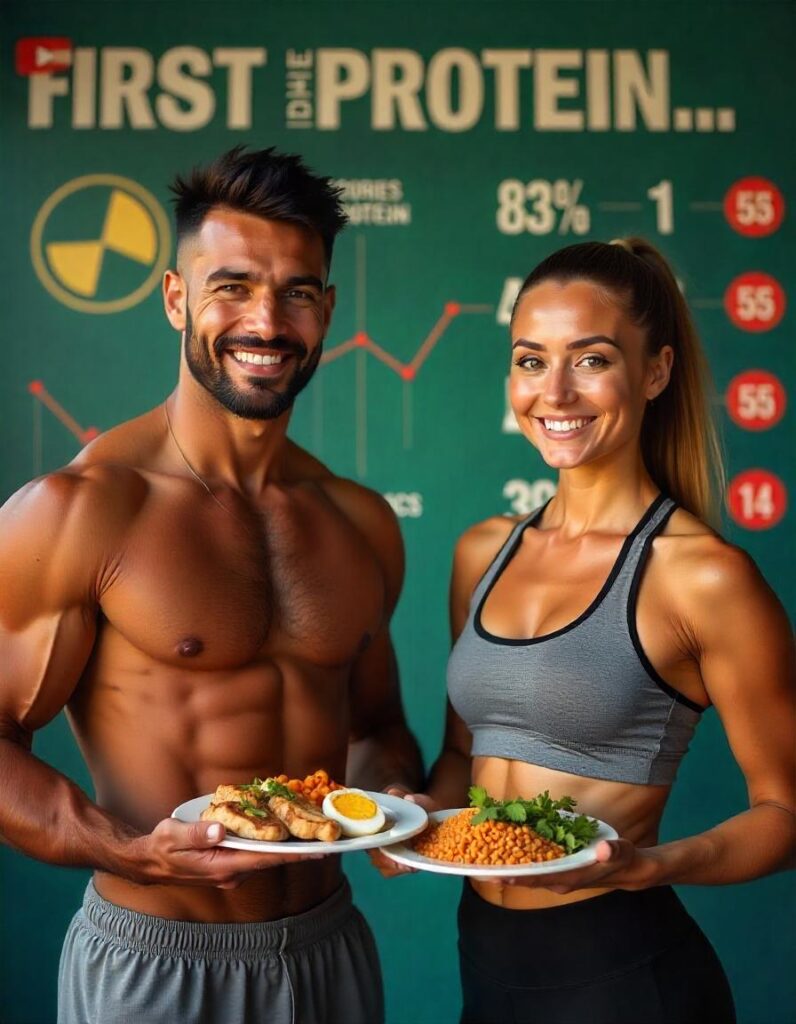Protein Intake Calculator
Your Recommended Protein Intake
grams per day
Protein Intake Guidelines
- Sedentary: 0.8g per kg of body weight
- Active: 1.0-1.2g per kg of body weight
- Athletes: 1.4-2.0g per kg of body weight
The Ultimate Protein Intake Guide
Fuel Your Body Right—Every Day

Ever wonder if you’re eating enough protein? Or maybe you’re trying to build muscle or lose weight and keep hearing that “protein is king.” Well, you heard right. Protein is the MVP of nutrients when it comes to building a healthy, strong, and energized body.
This mega-guide will walk you through everything you need to know about protein intake: how much you need, how to calculate it, what to eat, and how to avoid common mistakes. Let’s dive in!
Why Protein Is So Important
How Protein Works in Your Body
Think of protein as your body’s repair crew. From building muscle and hormones to skin and enzymes, protein is involved in almost every critical function.
Without enough protein:
- Your muscles won’t grow
- Your immune system weakens
- Your metabolism slows
- You may feel tired or mentally foggy
And that’s not what we want, right?
How Much Protein Do You Really Need?
Breaking Down Protein Requirements
There’s no one-size-fits-all here. The amount of protein you need depends on a few factors:
- Your body weight
- Your activity level
- Your fitness goals (muscle gain, weight loss, maintenance)
- Your age and gender
So let’s break it down with some real numbers.
Recommended Daily Protein by Age & Gender
| Group | Recommended Protein (grams/day) |
|---|---|
| Adult Women | 46g |
| Adult Men | 56g |
| Teenage Boys | 52g |
| Teenage Girls | 46g |
| Children (1-8) | 13g – 19g |
| Pregnant/Breastfeeding Women | 71g |
These are based on the RDA (Recommended Dietary Allowance), but keep in mind that RDA is the minimum to avoid deficiency — not the optimal amount for gains or weight loss.
Protein Intake by Activity Level
Here’s a simple table to give you context:
| Activity Level | Protein (grams per kg body weight) |
| Sedentary | 0.8g |
| Light Activity | 1.0g – 1.2g |
| Moderate (3-5x/week) | 1.4g – 1.6g |
| Active (daily workouts) | 1.6g – 2.0g |
| Intense Training (athletes/bodybuilders) | 2.2g+ |
Protein Needs for Muscle Gain
Trying to bulk up? You’ll need:
- Around 1.6g to 2.2g of protein per kg of body weight
- That’s roughly 0.7g to 1g per pound of body weight

Muscles grow when you give them the raw material (protein) and stimulate them with resistance training.
Protein Intake for Weight Loss
Want to burn fat while keeping muscle? Here’s the trick:
- Eat slightly more protein than you think you need (1.6-2.4g/kg)
- Helps with satiety (feeling full)
- Prevents muscle loss during a calorie deficit
How to Calculate Your Protein Intake
Step-by-Step Instructions
Let’s go DIY. Here’s how you calculate your daily protein needs.
- Know your weight in pounds or kilograms
- Multiply it by the recommended protein range for your goal
Muscle Gain Example:
Weight: 180 lbs Multiply by 0.8g to 1g/lb Protein needed: 144g – 180g/day
Weight Loss Example:
Weight: 150 lbs Multiply by 0.7g to 1g/lb Protein needed: 105g – 150g/day
Using Body Weight (lbs & kg)
| Body Weight | Sedentary | Active | Muscle Gain |
| 120 lbs (54kg) | 43g | 65g | 95g |
| 150 lbs (68kg) | 55g | 82g | 120g |
| 180 lbs (82kg) | 66g | 98g | 144g |
| 200 lbs (91kg) | 73g | 110g | 160g |
Protein Intake Calculator (Manual or Tool)
Use this formula:
Protein (g/day) = Weight (lbs) × Activity Factor
Or plug into any reliable protein calculator online. Just make sure you choose your goal correctly (e.g., weight loss vs. gain).
Real-Life Examples
Sedentary Adult
Linda, 45 years old, weighs 160 lbs. Not very active. Protein needed: 160 x 0.8 = 128g/day
Active Female Trying to Lose Weight
Emily, 30, weighs 140 lbs, works out 4x/week. Protein needed: 140 x 1.2 = 168g/day
Male Bodybuilder
Chris, 28, weighs 200 lbs, trains daily. Protein needed: 200 x 1.0 = 200g/day (or more)
Protein Per Meal

Split your total daily protein across 3-6 meals. It improves absorption and utilization.
If you need 150g/day:
- 3 meals = 50g each
- 5 meals = 30g each
How Much Protein Can Your Body Absorb at Once?
A common myth says only 30g per meal can be used. Truth is, your body absorbs all of it — but the muscle-building part (muscle protein synthesis) is maximized around 20-40g per meal.
Best Protein Sources
Whole Foods vs Supplements
Real food wins most of the time, but protein powders help when:
- You’re in a rush
- You’re struggling to meet your goal
- You’re post-workout
Animal vs Plant Protein
| Source | Protein (per 100g) | Complete Protein? |
| Chicken breast | 31g | Yes |
| Eggs | 13g | Yes |
| Tofu | 8g | No (but close) |
| Lentils | 9g | No |
| Quinoa | 4g | Yes |
Protein Powders
Choose what fits your diet and digestion:
- Whey (fast-digesting)
- Casein (slow-digesting)
- Plant-based (pea, rice, hemp, etc.)
Common Mistakes in Protein Intake
- Relying too much on powders
- Not eating enough during weight loss
- Skipping protein at breakfast
- Ignoring protein in snacks
- Thinking “more” is always better

Protein and Special Diets
Keto
Protein is moderate (not high). Focus on fatty cuts of meat.
Vegan
Combine legumes + grains to get full amino acid profiles.
Intermittent Fasting
Make sure your eating window includes enough meals to hit your protein goal.
FAQs
1. Can I eat too much protein? Yes, but it’s unlikely unless you go extreme. High protein is safe for healthy kidneys.
2. Is plant protein as good as animal protein? Close, but not always complete. Mix sources to ensure full amino acids.
3. What’s the best time to eat protein? Post-workout is important. But spreading it evenly through the day works best.
4. Do I need protein powder to gain muscle? Nope! It helps but isn’t necessary if you meet your needs with food.
5. What happens if I eat too little protein? You lose muscle, feel weak, and slow your metabolism.
Conclusion: Your Protein Game Plan Starts Now
Now you know exactly how much protein you need, how to calculate it, and how to crush your goals with smart choices. Whether you’re a gym rat, a busy mom, or just starting your health journey — protein matters.
Don’t overthink it. Start small, track your intake, and adjust based on your energy, performance, and results.
Your body will thank you.
